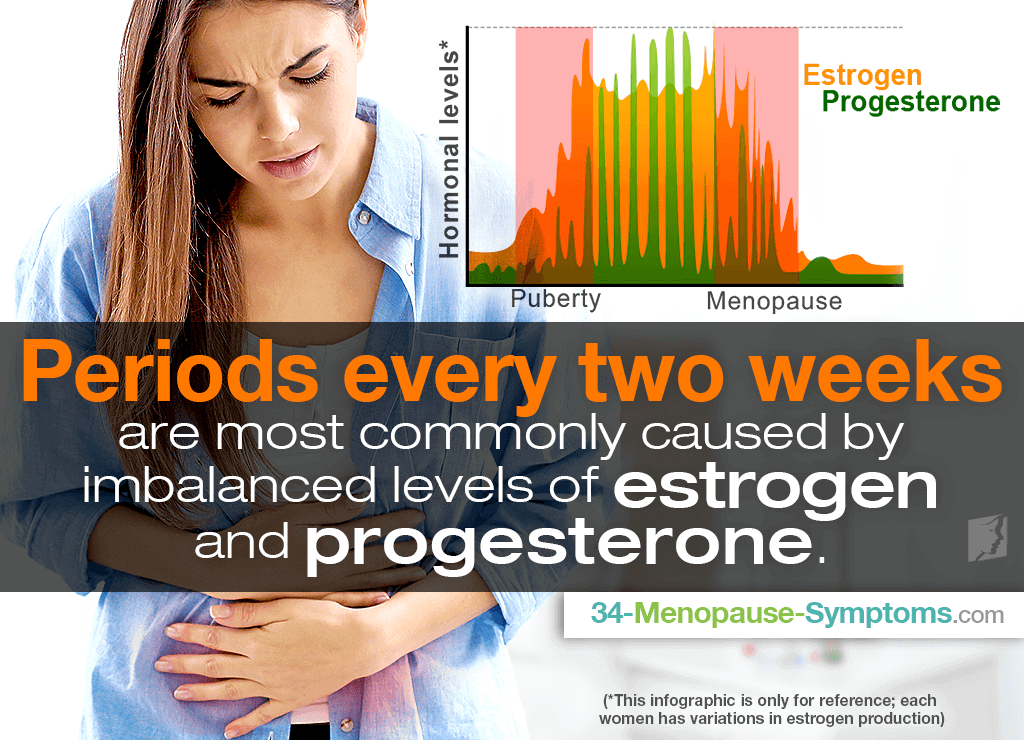When a woman's period deviates from a fairly regular cycle - for instance, having a period every two weeks or a period twice in one month - it is said to be irregular. Abnormal periods can encompass a broad range of issues concerning a woman's menstrual cycle, including their frequency.
Continue reading to learn more about periods every two weeks, including what is an irregular period, what causes two periods in one month, and how to manage and treat them with ease!
What Is an Irregular Period?
The average length of a menstrual cycle is 28 days, which means that a “normal” cycle can last between 21 and 35 days with bleeding lasting three to seven days.1 Any pattern that strays from this is considered an irregular period.
It is important to differentiate between frequent periods that occur every two weeks and intermenstrual bleeding, which some women might mistake for a period. Let's see how the two differ.
Intermenstrual bleeding is a medical term for bleeding or spotting between periods. The flow of blood is generally less heavy than during a period and not enough to soak through a panty liner.
Frequent periods, known as polymenorrhea, are defined as periods that occur less than 21 days apart, including every two weeks.2 Depending on a woman's flow, she will likely use several full-size sanitary pads over the span of three to seven days.
What Causes Periods Every Two Weeks?
Frequent menstruation can have a number of underlying roots, including hormonal and other causes. They include the following:
Hormonal Causes
Getting a period every two weeks is commonly caused by imbalanced levels of estrogen and progesterone. This frequently occurs during menopause as the ovaries transition into their non-fertile stage, causing drastic fluctuations of key reproductive hormones.
Other Causes
Polymenorrhea can also be caused by various medical conditions as well as certain lifestyle habits, such as the following:
Drastic weight loss
Going off or starting a new type of hormonal contraception
Obesity, especially if related to polycystic ovary syndrome (PCOS)
Benign uterine abnormalities, such as endometriosis and uterine fibroids
Certain types of cancer
How to Deal with Periods Every Two Weeks
There are wholesome habits that can help women manage having a period every two weeks. They include:
Staying hydrated to flush the body properly
Keeping a period calendar with the exact dates of your periods to help you make sense of your menstrual patterns
Carrying sanitary pads and tampons with you at all times so as not to be caught off guard in public
Trying gentle, regular exercises, such as calisthenics, long walks, or stretching routines. Restorative yoga can also relieve muscle tension and cramping as well as greatly help with premenstrual syndrome (PMS).
However, some women who receive a period every other week for an extended period of time without reprieve may want to consider treatment for long-term effectiveness.
Treatments for Periods Every Two Weeks
A woman can approach her periods occurring every two weeks with a variety of treatments, ranging from natural to more conventional ones.
Naturally and effectively treating irregular periods revolves around fixing the hormonal imbalance largely at fault for their occurrences, starting with an optimized diet rich in the plant-based estrogens as well as iron to replenish what's been lost from the extra bleeding.
For improved results, pair lifestyle changes with alternative medicine proven to work with the body to equilibrate reproductive hormones.
Conventional methods, on the other hand, often involve birth control prescriptions to solve getting a period every other week quickly. However, their usage should first be discussed with a doctor as they are considered more risky than natural measures, and symptoms may prove more hindersome.
Click on the following link to find out how to effectively treat irregular periods every two weeks to be able to finally enjoy a hormonally balanced life.
Sources
- ACOG. (2017). Abnormal uterine bleeding. Retrieved January 14, 2020 from
- https://www.acog.org/Patients/FAQs/Abnormal-Uterine-Bleeding?IsMobileSet=false
- Donnez, J. (2011). Menometrorrhagia during the premenopause: an overview. Gynecological Endocrinology, 27(1), 1114-1119. doi: 10.3109/09513590.2012.637341
- Love, S. (2003). Menopause and Hormone Book. New York: Three Rivers Press.
- Medline Plus. (2019). Vaginal Bleeding between Periods. Retrieved January 15, 2020 from https://medlineplus.gov/ency/article/003156.htm
Footnotes:
- Eunice Kennedy Shriver National Institute of Child Health and Human Development. (2017). What are menstrual irregularities? Retrieved January 15, 2020 from https://www.nichd.nih.gov/health/topics/menstruation/conditioninfo/irregularities
- Cleveland Clinic. (2018). Vaginal Bleeding. Retrieved January 15, 2020 https://my.clevelandclinic.org/health/symptoms/17899-vaginal-bleeding




